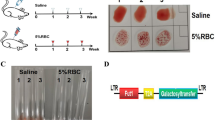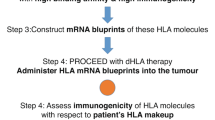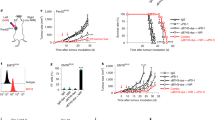Abstract
Graft-versus-host disease and marrow graft rejection are two major problems in the treatment of leukaemia with whole body irradiation, high-dose chemotherapy and bone marrow transplantation. Both these problems could be avoided if the patient's own bone marrow could be rendered aleukaemic in vitro and then reinjected into the patient after the radio-chemotherapy had been completed. Here we describe a model system in which lethally irradiated rats were injected with a mixture of bone marrow cells and leukaemic cells and in which the development of leukaemia in the recipient rats was prevented by incubating the cells, before injection, with a monoclonal antibody–-ricin conjugate that was selectively toxic to the leukaemic cells. Nonspecific toxicity of the conjugate to haematopoietic stem cells was blocked by carrying out the incubation in the presence of lactose which competitively antagonized the binding of the ricin moiety of the conjugate to galactose residues on the cell surface1–3.
This is a preview of subscription content, access via your institution
Access options
Subscribe to this journal
Receive 51 print issues and online access
$199.00 per year
only $3.90 per issue
Buy this article
- Purchase on Springer Link
- Instant access to full article PDF
Prices may be subject to local taxes which are calculated during checkout
Similar content being viewed by others
References
Olsnes, S., Saltvedt, E. & Pihl, A. J. biol. Chem. 249, 803–810 (1974b).
Youle, R. J. & Neville, D. M. Proc. natn. Acad. Sci. U.S.A. 77, 5483–5486 (1980).
Thorpe, P. E. et al. Clin. exp. Immun. 43, 195–200 (1981).
Dibley, M., Dorsch, S. & Roser, B. Pathology 7, 219–235 (1975).
Mason, D. W. & Williams, A. F. Biochem. J. 187, 1–20 (1980).
Williams, A. F., Galfre, G. & Milstein, C. Cell 12, 663–673 (1977).
White, R. A. H., Mason, D. W., Williams, A. F., Galfre, G. & Milstein, C. J. exp. Med. 148, 664–673 (1978).
Brideau, R. J., Carter, P. B., McMaster, W. R., Mason, D. W. & Williams, A. F. Eur. J. Immun. 10, 609–615 (1980).
Barclay, A. N. Immunology 42, 593–600 (1981).
Thorpe, P. E. & Ross, W. C. J. Immun. Rev. 62, 119–158 (1982).
Krolick, K. A., Uhr, J. W. & Vitetta, E. S. Nature 295, 604–605 (1982).
Thorpe, P. E., Edwards, D. C., Ross, W. C. J. & Davies, A. J. S. in Monoclonal Antibodies in Clinical Medicine (eds Fabre, J. & McMichael, A.) (Academic, New York, in the press).
Olsnes, S. & Pihl, A. in Pharmacology of Bacterial Toxins (eds Drew, J. & Dorner, F.) (Pergamon, Oxford, in the press).
Hunt, S. V. & Fowler, M. H. Cell Tissue Kinetics 14, 445–464 (1981).
Author information
Authors and Affiliations
Rights and permissions
About this article
Cite this article
Thorpe, P., Mason, D., Brown, A. et al. Selective killing of malignant cells in a leukaemic rat bone marrow using an antibody–ricin conjugate. Nature 297, 594–596 (1982). https://doi.org/10.1038/297594a0
Received:
Accepted:
Issue Date:
DOI: https://doi.org/10.1038/297594a0
This article is cited by
-
Monoclonal antibody L6-daunomycin conjugates constructed to release free drug at the lower pH of tumor tissue
Cancer Immunology Immunotherapy (1991)
-
Intratumour therapy of solid tumours with ricin–antibody conjugates
Immunology & Cell Biology (1989)
-
Demonstration of ricin within the mammalian para-aortic lymph node
The Histochemical Journal (1989)
Comments
By submitting a comment you agree to abide by our Terms and Community Guidelines. If you find something abusive or that does not comply with our terms or guidelines please flag it as inappropriate.



